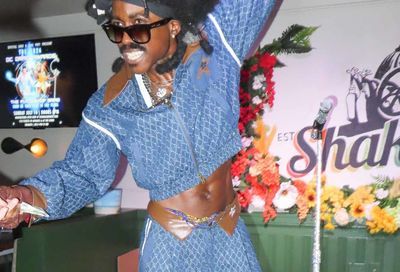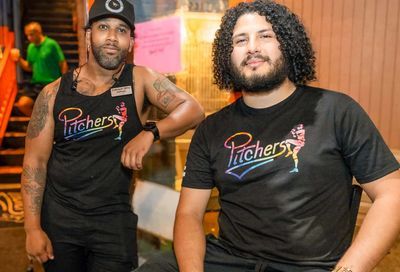North Carolina Democratic congressional candidate apologizes for voting for anti-trans “bathroom bill”
Viral ad from Democratr Charles Graham leads Twitter activists to scrutinize his voting record as a state representative.

A Democratic congressional candidate has apologized for his past support of HB 2, the controversial “bathroom bill” that barred transgender people from using facilities in government-owned or public buildings that match their gender identity.
State Rep. Charles Graham (D-Robeson), a member of the Lumbee tribe of North Carolina and currently the only native American serving in the North Carolina General Assembly, recently announced his campaign for Congress by launching an online ad that went viral.
In the ad, Graham recounts the story of the Battle of Hayes Pond, in which 400 Lumbees surrounded and chased off about 50 members of the Ku Klux Klan who had planned to hold a rally and burn a cross in a field near Hayes Pond, in Maxton, North Carolina on January 18, 1958. The rally had been intended to stir up support for the KKK in the racially-diverse Robeson County by terrorizing Lumbee and Black residents of the area.
Graham invokes the idea that the Battle of Hayes Pond was about “hundreds of normal folks deciding to stand together against ignorance and hate,” and, as images of the Jan. 6 insurrection and the 2o17 “Unite the Right” rally in Charlottesville, Virginia, flash on the screen, compares that fight to today’s struggles against lies, misinformation, and attempts by politicians to divide people by making them believe “that you can’t trust your neighbor, that they want something that’s yours, that you must live in fear of them.”
I’m an educator, a legislator, a small business owner, and a proud member of the Lumbee Tribe.
Now, I’m running for Congress. pic.twitter.com/NFaUnIh4Gt
— Charles Graham (@CharlesGrahamNC) October 6, 2021
The ad subsequently went viral, being viewed more than 3 million times on Twitter and allowing Graham to raise more than $20,000 for his campaign, reports Raleigh-based NBC affiliate WRAL.
But as the ad was being shared online by people of left-leaning political persuasions, critics began pointing out Graham’s more conservative voting record in the General Assembly, including his support for some abortion restrictions, in favor of allowing firearms on school grounds, and opposing a statewide mask mandate — all votes largely in keeping with the prevailing sentiment in his conservative district, which has begun trending more Republican as rural voters sour on Democrats due to culture-war issues.
But no issue was as contentious online, especially among younger and more progressive Twitter activists, than Graham’s support for HB 2, which restricted which facilities transgender people were able to use in government-funded buildings and overturned all existing local LGBTQ-inclusive nondiscrimination ordinances in the state after the city of Charlotte passed a trans-inclusive ordinance prohibiting discrimination in public accommodations.
The controversial law sparked an economic backlash, prompted calls for boycotts, and resulted in the imposition of bans on state-sponsored travel to North Carolina, leading some companies to scuttle plans to expand in or relocate to the state. The backlash has been cited by some political activists, particularly on the left, as one of the factors in former Republican Gov. Pat McCrory’s defeat for re-election, even as Donald Trump was winning the state handily over Hillary Clinton at the presidential level.
Following McCrory’s defeat, lawmakers voted to “repeal” the law in name while keeping some of its more pernicious provisions intact. To this day, counties and municipalities are barred from issuing public bathroom regulations or policies that go beyond the scope of those approved by the General Assembly. The “repeal” bill also imposed a moratorium for nearly four years that prohibited municipalities from passing LGBTQ-inclusive nondiscrimination ordinances. Since that moratorium has expired, several cities throughout the state have begun passing such ordinances — minus explicit protections for public bathrooms — in order to restore ordinances that were repealed by HB 2 and demonstrate local support for the LGBTQ community, all while attempting to avoid incurring the wrath of the Republican-led legislature.
Graham, who was one of only 11 Democrats in the legislature to vote for HB 2, was caught flat-footed after the bill, and mocked by the Durham-based progressive tabloid Indy Week for giving a bumbling response that invoked well-worn tropes and conservative talking points about alleged predators entering women’s bathrooms, the need to protect children, and concerns about bodily privacy.
“Um. I wanted to, uh… I felt that the constituents that I represent would want me to vote that way, and of course, uhhhh, I’m, uh, um… you know, a representative of the people of Robeson County, and, umm, I certainly had a lot of, um, folks who encouraged me to not support, support that ordinance, because it would, could have had statewide implications. Of course… uh… that’s why, um, I voted the way I did,” Graham was quoted as saying.
Under the current congressional map — which could be subject to change, depending on how lawmakers redraw the lines during the redistricting process — Graham would likely run in the 9th Congressional District, which combines rural areas around Robeson County with some of Charlotte’s toniest and heavily Republican suburbs. That means, should he win the Democratic primary, he would face off against incumbent Republican U.S. Rep. Dan Bishop, a former state representative who was the chief sponsor of HB 2 — a coincidence that appeared likely shine a spotlight on his past support of the bill.
But on Tuesday, Graham issued a formal apology for his vote on HB 2, saying it was a mistake to vote on the bill, which was rushed through the legislature by GOP leaders as part of an effort that critics have since characterized as an election-year gimmick.
“I believe human dignity is a human right. It’s a value I hold dear — but five years ago I failed to uphold my own value when I voted for HB 2, and it was a mistake. It was a bill written and voted on within 24 hours, with the conversation surrounding protecting children and women, but I should have done more research to completely understand the impact of the bill,” Graham said in a statement.
“After the hurried vote, I spent the following days talking with colleagues and transgender-rights activists about the impacts of the bill — I became a full supporter of recalling the bill and worked across the aisle to fully repeal it. To the LGBTQ+ community, and specifically to the transgender community who suffered real pain from this bill and the rhetoric that surrounded it, I am sorry,” he continued. “I have always tried to do what is right, but I am not perfect. I’m running for Congress to stand up against hatred and ignorance, and I expect to be held accountable when I fail to live up to my own principles.”
Charlotte Clymer, a transgender activist and writer, responded to Graham’s statement, tweeting: “I really appreciate this statement from @CharlesGrahamNC. As a trans woman, I was very upset when I learned he voted for HB 2. However, I’m quite impressed with this thoughtful apology. We should encourage leaders to learn and grow. This is a good thing.”
Graham responded to Clymer in turn: “Charlotte, thanks for hearing my apology. I can’t promise I’ll always be right, but I can promise I’ll always listen. I hope you and I can continue to have these important conversations. Stay well.”
Charlotte, thanks for hearing my apology. I can’t promise I’ll always be right, but I can promise I’ll always listen. I hope you and I can continue to have these important conversations. Stay well – Charles
— Charles Graham (@CharlesGrahamNC) October 5, 2021
See also:
Most Americans support LGBTQ nondiscrimination laws, but trans rights continue to divide
Support Metro Weekly’s Journalism
These are challenging times for news organizations. And yet it’s crucial we stay active and provide vital resources and information to both our local readers and the world. So won’t you please take a moment and consider supporting Metro Weekly with a membership? For as little as $5 a month, you can help ensure Metro Weekly magazine and MetroWeekly.com remain free, viable resources as we provide the best, most diverse, culturally-resonant LGBTQ coverage in both the D.C. region and around the world. Memberships come with exclusive perks and discounts, your own personal digital delivery of each week’s magazine (and an archive), access to our Member's Lounge when it launches this fall, and exclusive members-only items like Metro Weekly Membership Mugs and Tote Bags! Check out all our membership levels here and please join us today!


























You must be logged in to post a comment.